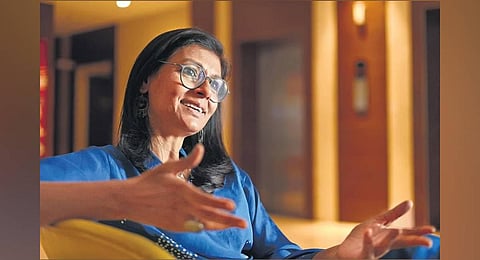

THIRUVANANTHAPURAM: Asy elegance is one way of describing how award winning actor-director Nandita Das conducts herself – on-screen and off it. The meticulous method actress refined her art across nearly 40 films, including those by bigwigs such as Mrinal Sen, Adoor Gopalakrishnan, Shyam Benegal, Deepa Mehta, and Mani Ratnam.
Nandita, who has also aced her directorial journey, was at IFFK as part of the Indian premiere of her latest flick ‘Zwigato’, which stars Kapil Sharma and Shahana Goswami in the lead roles. In a tete-a-tete with TNIE, Nandita shares her vision on filmmaking, her journey with ‘Zwigato’, her other interests, and more.
Why did you choose IFFK for the Indian premiere of ‘Zwigato’?
I have come here as an actor and director. The audience here is vibrant and spirited, with interesting questions. It’s a good way to start a new journey with my film from this part of the country.
‘Zwigato’ is cast in a different genre compared to your last directorial project ‘Manto’. How did you come up with a family drama?
The pandemic was on and we were stuck at home. I wanted to do an anthology with four filmmakers. This was my film and was initially planned as part of the anthology. But the project did not materialise. It was producer Sameer Nair who suggested conceiving it as a feature film. The story delves into Manas, played by Kapil Sharma, who becomes a food-delivery man after losing his job due to the pandemic. Food delivery men were our saviours during the pandemic. I felt the importance to address the things around us.
What have to tried to address through ‘Zwigato’?
The film is not only about the economy. It is also about the disparity in gender, caste, class, and religion as they co-exist in society. In modern India these disparities are hidden as the lives of common men have become invisible. There was a time when the protagonist was a common person, and now to make
a film there must be drama. Just regular lives, small losses of dignity, and small indignation are
not explored much now.
The whole film portrays the working class as invisible, as it is in real life. Every city has daily wagers who come out in hordes every morning seeking daily assignments. In a way, the delivery job is also a daily-wage job filled with anxiety about meeting targets and orders. So the whole film is peppered with the motif of the working class. Manas formerly worked in a factory, in an office environment, and he is alone in his universe. Over the pandemic, unemployment increased. I wanted to show that one will be ready to do any job when left unemployed.
Why did you choose Kapil Sharma as the protagonist?
In Hindi films there are very few people who can portray the common man with conviction. I didn’t know about Kapil’s talk show (The Kapil Sharma Show) until I cast him. I came across a small video on social media. There was some vulnerability and naturalness that I noticed about Kapil in the video. He was making jokes about ordinary people which the common man could connect with. He is still rooted as he struggled with many odd jobs before turning to stand-up.
I don’t conduct serious casting auditions for my films and 95% of the cast are locals from Bhubaneswar who have never faced the camera, including the children. I felt Kapil was very natural and due to his comedy act he has the gift of timing. Of course, he is not an actor’s actor but he completely infused into the character.
How have your experiences over the years shaped you?
Looking back 25 years, the changes in my life were because of the films I have watched, the books I have read and people I have met. Art has a sublime influence on life. One’s subtlety and honesty stays with us, subconsciously. We can empathise with others through art.
We live in a country where freedom of expression is being questioned on a daily basis. How easy is it to make independent films?
Iran does better than us (laughs). We find ways to express ourselves. I don’t believe in censorship in any form, except self-censorship. I could have done blame-game films and more dynamic ones in my career. But I only choose to say human stories. Even ‘Manto’, which showcased the Partition, could have portrayed violence, war or explicitly the sexual concoctions that underly them. But I am not into sensationalising or glamorizing violence. The purpose is to create empathy. I don’t want to sharpen things and make them preachy even though I come from a social-work background.
Are woman filmmakers a privileged lot in India?
When I started, I wanted to know how a woman director is and I was not conscious of my gender. I wanted to be just a director and the title was annoying. When I did Manto, I embraced that title as I want more women directors to emerge. When we reach equality we do not need that privileged title as we will be mentioned as directors. I came to know that in Kerala there are fewer women participating in films behind the camera. Representation in front of the camera and behind need to be increased.